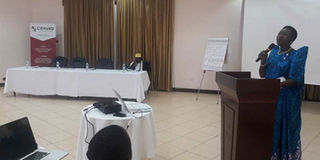Minister to religious leaders: Don't make U-turn on sexuality education

State minister for Primary Education, Rosemary Nansubuga Sseninde stressing a point about national sexuality education framework in Kampala on November 22, 2018. Photo by Anthony Wesaka
What you need to know:
- The current framework has been developed based on the following principles; the fear of God, parental role in child upbringing, centrality of the family in child upbringing, age appropriateness, risk avoidance and rehabilitation.
- Statistics show that 25 percent of the adolescent girls are pregnant or have already had their first child.
KAMPALA. The State minister for Primary Education, Rosemary Nansubuga Sseninde, has urged religious leaders and other stakeholders not to make a U-turn in supporting the roll-out of the National Framework on Sexuality Education.
Sseninde wondered why there is a growing reservation from stakeholders and yet the same were consulted before coming up with the current draft on sexuality education.
"There have been press reports to the effect that some religious leaders have expressed reservations about aspects of the national sexuality education framework. As already noted, the ministry consulted extensively with the leadership of all major religious organisations," she said at the national dialogue on sexuality education framework organised by Centre For Health, Human Rights and Development.
According to her, the inter-religious council pledged commitment to support rollout of the national framework on sexuality education during the launch of the framework.
Sexuality education which has become a hot topic lately, is the provision of age-appropriate, scientifically accurate, non-judgmental and culturally relevant information and opportunities to young people to explore attitudes, practice decision making, communication and other skills needed to make informed decisions about their sexual and reproductive health and well-being.
Going forward after being faced with the challenge of growing reservations, minister Sseninde revealed that her ministry has decided to re-engage with all those stakeholders who may still have questions about national sexuality education framework in order to address their concerns.
She added that so far, a team led by Muffi Shaban Ramadhan Mubaje has already submitted their concerns to them.
The minister further revealed that they have also reached out to various religious institutions like the Anglican Church, Orthodox Church, Seventh Day Adventist and Born again churches.
On 17th September 2016, Parliament passed a resolution, directing the Education ministry to halt the teaching of comprehensive sexuality education in schools until a policy has been developed.
The Education ministry in full compliance with directive of Parliament, issued a circular to education institutions and partners directing them to desist from conducting any sexuality education related programmes.
The ministry immediately embarked on a process of developing a national sexuality framework. A guiding technical draft was produced and a team embarked on collecting views from a wide selection of stakeholders across the country.
On May 11, 2018, the Education minister who is also the First Lady, Janet Museveni, launched the national sexuality education framework. The framework is to guide the delivery and direction of providing sexuality education in the formal education setting for young people.
It's this sexuality education framework that some religious leaders have expressed reservations about some aspects which the minister has assured that there will be a re-engagement with them to answer their concerns before the final policy is rolled out.
The current framework has been developed based on the following principles; the fear of God, parental role in child upbringing, centrality of the family in child upbringing, age appropriateness, risk avoidance and rehabilitation.
Statistics show that 25 percent of the adolescent girls are pregnant or have already had their first child. Further, statistics show that girls under at the age of 15 years, 68 percent of them have already had sex while their male counterparts at the same age, stand at 62 percent who have had sex.




